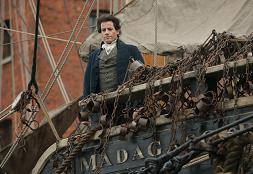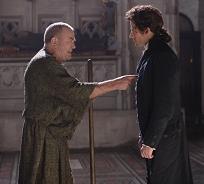 Before seeing the movie “Amazing Grace,” I didn’t know who William Wilberforce was. I had no idea that the namesake of Wilberforce University, the nation’s first historically black college, was a British man who fought long and hard for the abolition of slavery in the 18th century. It was also news to me that John Newton, the author of “Amazing Grace,” was a former slave ship owner who turned to the church to atone for the sins of his earlier life.
Before seeing the movie “Amazing Grace,” I didn’t know who William Wilberforce was. I had no idea that the namesake of Wilberforce University, the nation’s first historically black college, was a British man who fought long and hard for the abolition of slavery in the 18th century. It was also news to me that John Newton, the author of “Amazing Grace,” was a former slave ship owner who turned to the church to atone for the sins of his earlier life.
I point out these two facts to acknowledge what I believe is the strongest selling point for this movie: knowledge. Sure, there is much to mock about the film, what with its follicular achievements—yes, those are wigs–and heaving bosoms, namely those of Barbara (Romola Garai), the headstrong woman who was smitten with Wilberforce and had a décolletage to die for. And there was an over-abundance of scenes worthy of 18th-century C-SPAN. But despite all of that, the film offered a deeply profound learning experience.
The story follows Wilberforce (Ioan Gruffuld), one of the youngest members in the House of Commons, in his fight to abolish slavery in the British Empire. Guided by God, a song, and a band of brothers committed to the cause, Wilberforce spent a great deal of his life bringing a voice to the injustice of the slave trade. Much of the movie takes place in Parliament, but it also manages to paint a vivid—if not sickening—picture of the brutality of the slave trade and the ignorance of the British at that time.
As an African-American woman who finds it particularly difficult to sit through movies dealing with the historic struggles of Africans and African Americans, “Amazing Grace” pulled me in, in an almost divine manner. It became apparent to me that I needed to go back to the basics. All of the books that I was only obligated to read for school would now be read voluntarily. This movie allowed me to consider every person, both black and white, who made a way for me. I walked away feeling like John Newton, whom after going blind, finally put his story on paper and only then did he feel like he could finally see.


